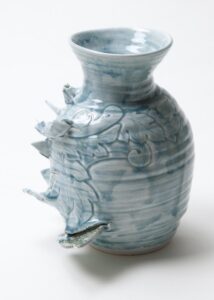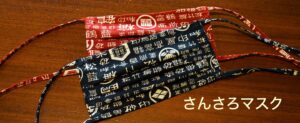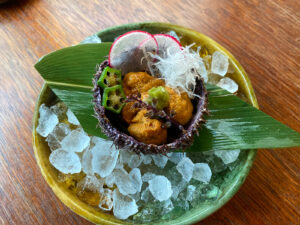What exactly is sushi, what is not?
It is not enough just to deal with the typical manifestations of sushi.
Because sushi is more than we assume here in the West. And in some respects it is less. Because the mere association "raw fish = sushi" is not enough.
In our series about the different forms and varieties of sushi we can make some well-known basic forms of sushi like Nigiri and Maki identify and some rarer, regional or historical Sushi molds.
However, there are still some things - especially in the western world - that look like sushi - but are definitely not sushi. At least if you value Japanese taste and the expertise behind it of chefs who are really familiar with Japanese cuisine.
Age sushi - definitely not Japanese cuisine!
Age sushi can be translated from Japanese as "deep-fried sushi."
And especially in Munich more and more restaurants can be found lately, which also offer such a sushi...
But this concept is actually a big surprise for Japanese people - to put it diplomatically.
Sometimes age sushi is served in restaurants outside of Japan. This is especially the case when the menu is created by people who are not trained in Japanese cuisine and know little about Japanese food.
Sometimes we see deep fried sushi in kaiten sushi restaurants in Germany
This always raises the question that the deep-fried sushi is simply the leftover pieces from the day before. In Japan, this form of "sushi" is slowly catching on. We actually found an article from Japan on the Internet that calls age sushi edible after all! (see https://livejapan.com/ja/article-a0000736/)
But is this really still sushi or already a completely different dish that goes in the direction of tempura? In any case, age sushi is to be seen very critically from a "Japanese" point of view, because ultimately it masks the fine fish and rice flavor. Therefore, such sushi is often combined with thick sauces.
Date maki: not a sushi roll
Date maki (伊達巻) sounds like sushi (maki sushi, to be exact), at least in name, but this is not sushi.
Date make is typically served on New Year in Japan and consists of egg and fish paste.
Date maki may look like tamago yaki to us "foreigners" at first glance, but it is actually a different dish that is supposed to bring good luck at the beginning of the new year (see https://www.kamaboko.com/column/2208/ and https://jpnculture.net/datemaki/).
Sashimi is not sushi!
Although often served together with sushi and somehow quite related, sashimi is not sushi. Sushi is unthinkable without the mild, vinegar-soured rice.
However, sashimi is definitely a historical dish and not a new invention - and accordingly, the dish is interesting. Sashimi is very important in Japanese cuisine and points far beyond sushi. We have more information in our comprehensive article about sashimi compiled.


